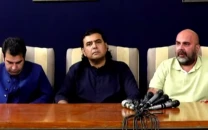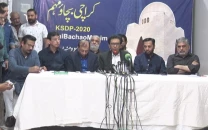Respect opinions: Religious freedom subject to upholding order
‘Apostasy, heresy are seen as threats to national security’

Respect opinions: Religious freedom subject to upholding order
Nelson, author of In the Shadow of Shari’ah: Islam, Islamic Law and Democracy in Pakistan, drew on examples from Malaysia and Pakistan to show how religious freedoms could be derogated by law to uphold public order. He presented his arguments in light of issues of apostasy, heresy and security.
The Declaration of the Rights of Man and of the Citizen, passed by National Constituent Assembly of France in 1789, in the aftermath of the French Revolution, says: No one shall be disquieted on account of his opinions, including his religious views, provided their manifestation does not disturb the public order established by law.
Considered one of the most fundamental documents in the history of human rights, the declaration places public order above religious freedom, Nelson said. Similarly, Article 9 of the European Convention on Human Rights holds religious freedom subject to the interests of public safety, for the protection of public order, health or morals, or for the protection of the rights and freedoms of others.
In his study of derogation clauses in constitutions around the world, Stephen Humphreys found that 147 states held fundamental rights subject to public order. They use the language of security to create conditions wherein a state of exception vis-à-vis religious fundamental rights is evoked, he said.
The idea is that religious deviation could unsettle communities and leave them vulnerable to “external threats”, he said. One would expect apostates and heretics to be smack in the middle of debates surrounding religious freedom.
In Malaysia and Pakistan, apostates and heretics are considered provocateurs – they provoke the community to react and create a sense of moral confusion. If one case of apostasy is permitted, will others follow, thereby unravelling the sense of community?
Similarly, if public acts of heresy are allowed, people believe that the sanctity of Islam is threatened. It is believed that such incidents can lead to public agitation, which weakens the community from within. The multi-stage situation starts at a personal level and snowballs to the state-level, finally weakening the state and, according to some citizens, leaving it vulnerable to external threats.
Nelson’s paper looked at the construction of this threat, which he said was a social construction reminiscent of Dr Jekyll and Mr Hyde in that the existential threat was constructed from within. Similarly, apostates and heretics created the sense of insecurity from within, like a cancerous growth that needed to be nipped.
Pakistan and Malaysia share the same British colonial history and several post-colonial commitments. On the subject of human rights, both countries treat religious freedom as provisional.
In Pakistan, the law is completely silent with reference to apostasy, but not on heresy. Heresy is addressed through amendments to blasphemy laws, derived from a colonial law from the Indian Penal Code of 1860. The same law is present in India, Bangladesh, Malaysia and Singapore to date, albeit, as in Pakistan, amended in various ways.
“In Malaysia, heresy, called religious deviance, is not addressed through the blasphemy law, but through the Internal Security Act.” So a heretic in Malaysia was not going to be considered a blasphemer, but a threat to the country’s internal security. One would expect Pakistan and Malaysia to use Islamic law to handle these subjects, but one used an amended colonial law and the other, an internal security law. Cases of apostasy in Malaysia, however, were referred straight to the state-level court and dealt with as a security issue, he said.
Nelson’s paper examined the question of whether setting aside religious freedoms in Islamic countries like Pakistan and Malaysia has provisions in Islamic law. Not necessarily, he said. The other question he examined was whether this was a product of authoritarian regimes. Malaysia and Pakistan had both had a long-drawn relationship with authoritarianism, he said.
But this argument jarred with empirical evidence, he admitted. For example, Zulfikar Ali Bhutto reduced the space for religious minorities (Ahmadis) after a dictator (Ayub Khan) had tried to protect that space. Maudoodi was tried for treason for playing a role in the 1953 Lahore riots against the Ahmadiya community.
“Setting aside religious freedoms in light of public order is practiced across the board,” Nelson argued, among secular countries and Islamic countries, in democracies and dictatorships.
In Pakistan, Article 20, meant to uphold the freedom to profess religion and manage religious institutions, was the same law that also held the freedoms contingent to public order, he said.
This was reflective of the state’s struggle for power, he said. But the power to define parameters of public order eventually translated into power to define the parameters of religion itself.
Nelson said there was a need to shift the conversation away from fundamental rights to questions surrounding security and existential threats to the state.
Published in The Express Tribune, November 19th, 2014.



















COMMENTS
Comments are moderated and generally will be posted if they are on-topic and not abusive.
For more information, please see our Comments FAQ